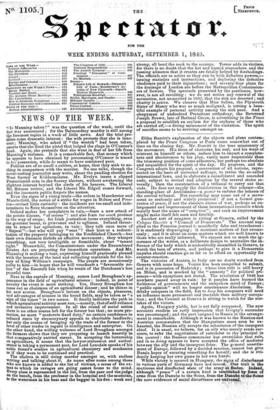NEWS OF THE WEEK.
"Is Manning taken?" was the question of the week, until the fact was announced ; for the Bermondsey murder is still among tie foremost topics in a week of little news. And the trial pro- mises some dramatic interest : the wife protests that she is inno- cent; Manningt who asked if "the wretch" had been taken, asserts that she fired the pistol that lodged the slugs in O'Connor's head. Again, she pretends that she went in fear of her life from Manning's violence. It is a remarkable fact, that money which he appears to have obtained by personating O'Connor is traced to her possession while he seems to have continued poor.
Politics are die) small a calibre, at home, that they sink to no- thing in comparison with the murder. No one talks, though the never-resting journalist may write, about the pending election for West Surrey or Kidderminster. Mr. Evelyn issues a clipped Protectionist coin to the Surrey electors, without awakening the slightest interest beyond the circle of his hearers. The Liberal Mr. Briscoe retires, and the Liberal Mr. Edgell comes forward, and the insensate public forgets the names. Even the signs of a rising trade—the orders in Manchester and Macclesfield, the notice of a strike for wages in Bolton and Pres- ton—attract little curiosity : the incidents are too small and inde- terminate to force themselves on the attention.
Ireland makes her complaints in vain,—fears a new attack of the potato disease, "of course" ! and also fears too much produce in the way of crops ; for Irish journalism turns everything, even the greatest boons, to grievance and to ugliness. Ireland threat- ens to renew her agitations, in vain : they talk once more of "Repeal "—but who will pay " rent "4 they hint at a redistri- bution of the property belonging to the Established Church—but their own disunion forbids an effective movement ; they whisper something, not very intelligible or formidable, about "tenant right." Meanwhile, the Commissioners under the Encumbered Estates Act are preparing for immediate operations. And Mr. Macaulay is making a tour, expressing himself graciously pleased with the beauties of the land and collecting materials for the his- tory of King William's campaign. The people are monstrously polite to him—in hopes that he will vouchsafe a "favourable no- tice" of the Emerald Isle when he treats of the Dutchman's less peaceful tour.
Next to the capture of Manning, comes Lord Brougham's ap- pearance in the field of agricultural science : indeed, in point of novelty the event is more striking. Yes, Henry Brougham has come out as chairman of an agricultural dinner ; and he shines in his new avatar. Brougham's lecture on the objects, pleasures, and advantages of science in the broad fields, may be taken as "a sign of the times " in two senses. It finally indicates the path in which agricultural activity must run,—namely, that of self-reliance and inventive improvement. In all the round of social action there is no other course left for the farmer but that ; no more pro- tection, no more "moderate fixed duty," no certain confidence in reduced rents by eleemosynary appeals to charitable landlords; but only the course of bringing up the trade of the farmer to the level of other trades in regard to intelligence and enterprise. On the other hand, the willing welcome of Lord Brougham amongst the farmers shows that they are preparing to launch heartily in that comparatively untried career. In accepting the lectureship on agriculture, it seems that the lawyer-statesman and author- orator is taking a permanent post, for Lord Lonsdale speaks of his noble friend's studies in agricultural chemistry and mechanics as if they were to be continued and practical.
The cholera is still doing murder amongst us, with endless writing and talking about it. As name after name among those who are known is added to the list of victims, a sense of the ex- tent to which its ravages are going comes home to the mind. Every class is represented in the list, from the peer and thejudge on the bench, from the professor in the hospital and the musician, to the Waterman in his boat and the beggar in his den : weak and strong, all bend the neck to the scourge. Terror adds its victims, for there is no doubt that the hot and humid atmosphere and the passing ailments that it creates are fatally helped by forebodings. The officials are as active as they can be with defective powerst- issuing statistics and instructions, and deploring the defective obedience paid to their injunctions ; and seventy-four plans for the drainage of London are before the Metropolitan Commission- ers of Sewers. The spectacle presented by the pestilence, how- ever, is not all revolting : we do not notice any renewal of the accusation, not unmerited in 1832, that the sick are deserted ; and charity is active. We observe that Miss Sellon, the Plymouth Sister of Mercy who was so much maligned, is setting a beau- tiful example of personal activity among the sick poor. And a clergyman of undoubted Protestant orthodoxy, the Reverend Joseph Brown, late of Bethnal Green, is advertizing in the Times a proposal to establish an asylum for the orphans of those who are carried off,—a fitting monument of the visitation. The spirit of sacrifice seems to be reviving amongst us.


























